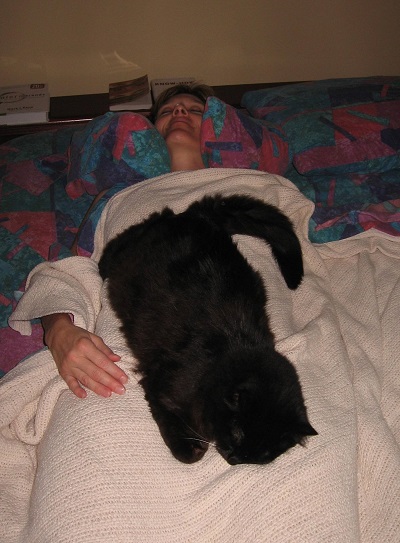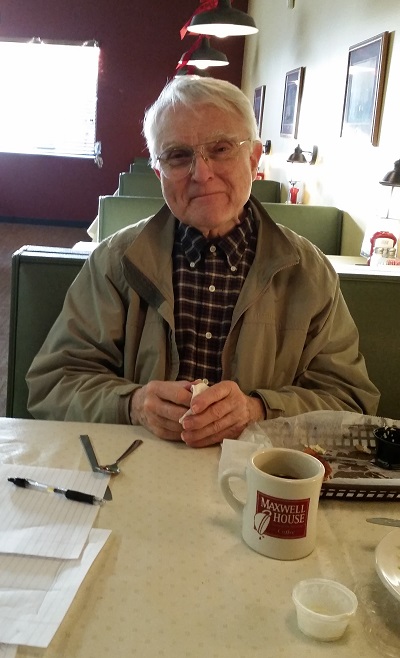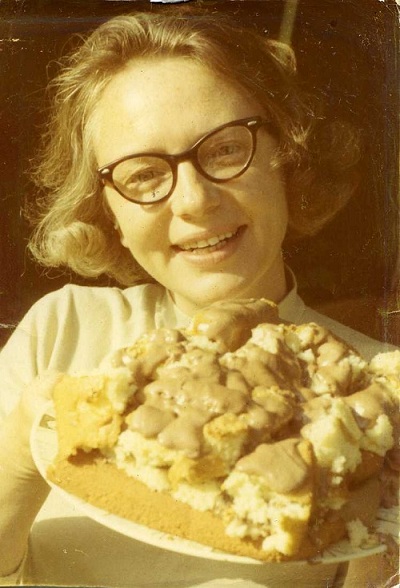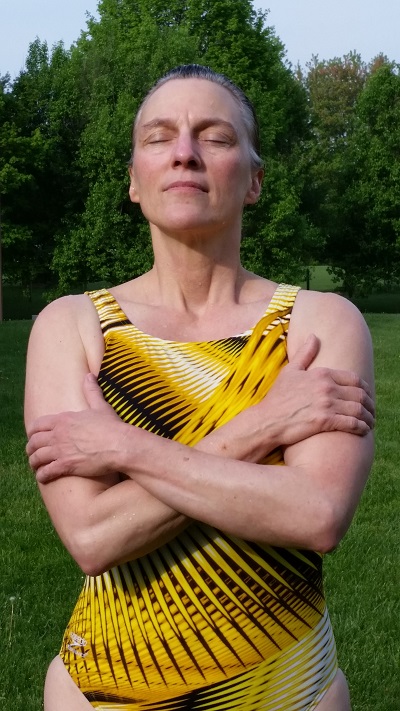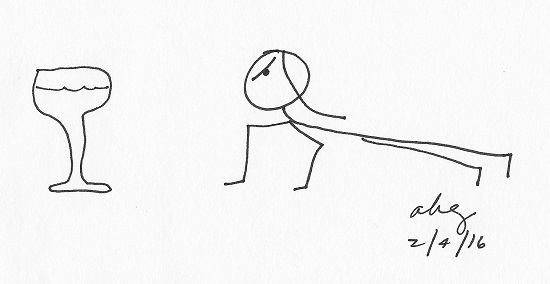When my sister and I were distressed as children, my father would call us Shoogy Shoogy in his quiet, strong voice. I heard such capacious acknowledgement of our woes and reassurance that we could handle them. My little back bowed in frustration, fists tight with anguish, I would hear Shoogy Shoogy and be unbent. I would straighten, unclench, and fall back with relief into the downy mattress of his acceptance.
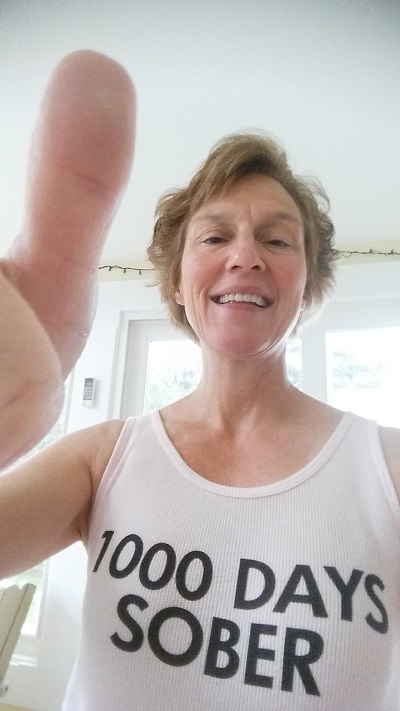 I never knew what a Shoogy Shoogy was until I realized as an adult that he was shortening and making even sweeter the endearment “Sugar.”
I never knew what a Shoogy Shoogy was until I realized as an adult that he was shortening and making even sweeter the endearment “Sugar.”
When we were children, my mother’s term of endearment for us was Little Toad. I don’t know much else to say about that. I could hear affection in her voice, yet the picture of the toad for the letter T in our alphabet book was ugly. I remember one time when I was sick, she must have gotten dressed and gone out because she came into my bedroom as beautiful as a Barbie doll, dressed in a grey winter coat with big buttons, her full lips smiling with bright red lipstick. She handed me colorful folders of paper dolls and sticker books from the dime store.
So here’s how I begin my letter to myself after three years of abstinence from alcohol:
Dear Shoogy Shoogy Little Toad,
Oh my poor dear one, if I knew three years ago – when you first realized you had a problem with alcohol – what I know now, I would have grabbed a down comforter, taken you in my arms, sat you in my lap, wrapped you up in warm softness, and rocked and rocked you.
What a horrible thing to have happened! You’re just going along doing your best, trying to do things right, trying to be good – trying to do good – and then this! Oh my dear I am so so sorry.
I know you want to get up and start trying to do something, anything to make this not so. Just rest a minute. Just stay here a minute and let me hold you a little longer.
Let your head keep resting against my heart and, as our friend Karan would say, let’s think a minute.
This year – 2016 – is the best year in the history of humankind to become aware of addiction to a substance and to get help for it. What you are thinking is wrong with you is simply not true.
You are thinking that your inability to stop drinking is the result of the deep flaw you’ve always suspected was there. You worked so hard to try to create evidence that it wasn’t true – such excellent work you do! But you believe that the truth about the core of you has finally shown itself. Your mother told you that you were “characterologically” flawed and incapable of loving correctly – yes, even using that word when you were such a small child. You got a master’s degree in counseling to help others, yes, but also to try to figure out how to dig deep enough to find and excise that flaw like a brown spot in a peach. And such a bitter irony that you specialized in addictions and here you are with one. You are reprimanding yourself mercilessly. You think you should have known better, worked harder, done better. You are thinking you should have been better.
Honey, honey, it’s okay. I know you’re feeling such deep remorse and shame and guilt. But that’s a result of what you’re thinking. And what you’re thinking isn’t correct.
Yes, when you drank Red Ripple wine in eighth grade, that was your choice. You were under age, you knew it was against your parents’ rules, but you did it anyway. I’m hugging you and laughing at how you became such a self-righteous non-drinker after that. You are so cute.
When you started drinking socially and occasionally in your mid-20s and continued that through your late-40s, you had too much a few times but, eh, no big deal.
The problem was when the kid pushed you in your classroom and you started having bad dreams after that, then the Virginia Tech shootings happened in your home town and you were in lock down with the same class that witnessed that push and your humiliation, then a kid in your classroom threatened to shoot you – well, you didn’t stand a chance. Such a lot happened in such a short time.
It’s a whole brain thing that I can explain to you later, but for now just know that trauma hurt your thinking, your occasional drinking interacted in a new way with that thinking, your thinking got additionally hurt, and alcohol got twisted in and before you knew it, drinking wine felt like hearing Shoogy Shoogy Little Toad.
And then alcohol became an unchoosable thing unto itself.
Here’s some good news. You are one of the many people who has learned to handle hardship with compliance or defiance. While each is an extreme coping strategy and has troubling components, your particular pattern of compliance is dumb luck when it comes to recovery from addiction. Addiction is an all-day, every-day condition that requires all-day, every-day care. The compliant have an easier time than the defiant.
Ah, but with what will I help you comply?
Here’s what we’re going to do. I’m going to get you help – evidence-based, science-based treatment for addiction. At the same time, I’m going to be protecting you. We’re going to run into a whole lot of well-intentioned people with a whole lot of opinions about addiction. Some of those people will end up being just plain mean. I won’t have it. No shaming, no humiliation, no “tough love,” no “breaking you down to build you up,” no “calling you on your shit.” Ridiculous. You don’t deserve it. Those ways are hurtful, not helpful. This is an illness and I’m going to get you genuine, authentic help for it.
That said, addiction is a complex illness with great uncertainty about what helps most people, most of the time, over the long-term. We’re going to have to take charge of this and be our own treatment coordinator – even our own treatment provider sometimes – and do some experimenting.
Get this, though. In conjunction with work done with physicians, counselors, treatment providers, and conscientious, supportive survivors – adding the acceptance of your father, the paradox of your mother, the knowledge that calming words calm you, plus the awareness that doing engaging things helps you feel better – that’s pretty much the formula for what a person can do on his or her own to support early recovery from addiction.
Unfortunately, we didn’t know this three years ago. Sorry beyond words for that three years of hell. Truly.
I know paper dolls and sticker books aren’t your cup of tea at 57 years old. But all that effort you put into attempting to be perfect and excise imperfection? We can shift your wonderful willingness and work ethic into learning who you really are as a human woman, embracing, yes, your flawed self, but with acknowledgement, acceptance, and reassurance. We can learn what you, as an adult woman, find interesting and engaging. It will be fun. I know you are fun-challenged. But, to quote your mother, we can give this a go.
After three years without even a drop of the neurotoxin alcohol further damaging our brain and central nervous system, we’re beginning to heal nicely. (Remember when we were told in high school health class the now-refuted, “Alcohol kills brain cells”? Of our billions of brain cells, we knew we had plenty to spare. But alcohol is a neurotoxin? Like arsenic and cyanide?! Might have been useful to mention.)
The automation of alcohol as go-to is getting clackety.
One of the greatest gifts we’ve received from fellow survivors is this commandment: “Don’t drink.” That’s your job, babe. No matter what. No matter what you feel, no matter what happens. It’s an absolute, unequivocal no.
My job – as your veteran-of-three-years sobriety companion and coach – is to reassure and calm you and to keep learning constantly about addiction and recovery so we give you the most advanced, state-of-the-science treatment we can find.
I will do the best I can. I am human. I will err. I will break your heart, I will break the hearts of those you love, I will sicken, I will tire, I will sometimes not know what do to do and sometimes I will simply do wrong. I wish I could promise I would always be there for you but we still have those nightmare things and I’ve worked diligently but still haven’t found a way to enter like Superwoman and save the day. Not yet, anyway. And I also have those weird dissociation things, you know those spells when I’m present and absent at the same time?
But Shoogy Shoogy Little Toad, I mean well, I try hard, and I care like crazy. I’m hoping, I’m thinking – I’m counting on – good enough most of the time actually being enough to save our day.
And remember just every once in awhile your mother would say, “You’re so funny”? And it wasn’t affection. It was love.
You are funny. And you’re cute.
Here, let me hold you just a little bit longer. Then we’ll keep giving this thing a go.
Love,
Anne
Photo: Selfie taken in shirt created to wear at home watching live coverage of the Unite to Face Addiction rally in Washington, D.C., October 4, 2015
Podcast of “Letter to Myself at Three Years Sober”:
Phoenix Rising (written at just over 2 years sober)
Letter to Myself at Two Years Sober
18 Months Sober and Still Not Happy?
Something I’ve Wanted to Tell You (16 months sober)
